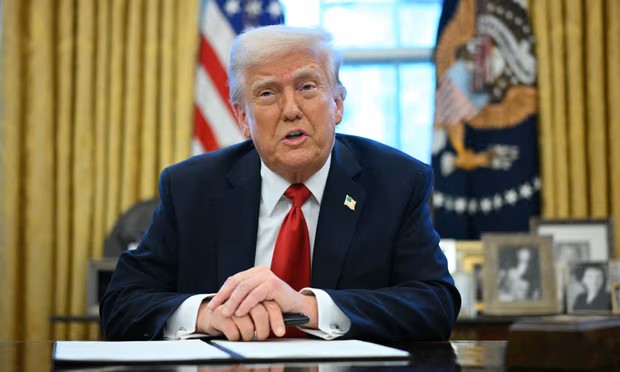By Atoyebi Nike
Nigeria’s financial markets stumbled at the start of November 2025, with the naira and the equities market recording notable losses after US President Donald Trump issued a warning suggesting the possibility of military intervention in Nigeria.
Fresh data from the Central Bank of Nigeria showed the naira, which recently hit a year high of N1,421.73 per dollar, weakened to N1,436.34 on Monday a 1.03 percent drop, amounting to N14.61 lost in a single day. At the parallel market, the currency slipped further to N1,455 per dollar, a movement traders linked to rising investor concerns and intensified demand for foreign exchange.
The depreciation followed a tense weekend in global politics. Trump, writing on Truth Social, tagged Nigeria a “country of particular concern” and instructed the US Department of War to prepare for “possible action” if alleged killings of Christians continued. He framed the threat as a response to what he termed “Christian genocide,” sparking widespread debate and raising fears about diplomatic fallout for Nigeria.
The shockwaves extended to the stock market. The All-Share Index edged down 0.25 percent to 153,739.11 points, shaving year-to-date gains to 49.37 percent. Market capitalisation fell by N245.88 billion to N97.58 trillion. Major selloffs in Aradel Holdings, which dropped 9.21 percent, and Access Corporation, down 3.07 percent, contributed significantly to the decline.
Market breadth was negative, with 38 laggards compared to 19 gainers. Union Dicon topped the gainers’ chart with a 9.93 percent rise, while Honeywell Flour Mills led the losers after sliding 10 percent. Trading activity also sank sharply as volume and value dipped 87.94 percent and 44.64 percent, respectively, to 627.5 million units worth N25 billion. UBA accounted for the largest trades with 136.8 million units valued at N5.5 billion.
Sector performance was mixed. The Oil and Gas, Commodities, Insurance, and Banking indices all closed lower, while Consumer Goods recorded a modest 0.49 percent gain. The Industrial index remained unchanged.
In the bond market, Cowry Assets Management reported weaker demand for Nigeria’s Eurobonds, with average yields rising 5 basis points to 7.70 percent on the back of geopolitical tension and global risk-off sentiment. Bloomberg data showed Nigeria’s dollar bonds ranking as the worst performers among emerging markets on Monday, with all ten notes falling into the global underperformers’ group. The 2047 issue recorded the steepest drop, losing 0.6 cents to 88.26 cents before recovering slightly.
While the market reaction was sharp, some analysts argued it may not persist. Tilewa Adebajo, CEO of CFG Advisory, described the dip as a “blip,” noting that global market prices had already shown signs of stabilisation and Nigeria’s removal from the FATF Grey List continued to support long-term market fundamentals.
However, Dr Musa Yusuf, CEO of the Centre for the Promotion of Private Enterprise, warned that Trump’s comments could be damaging to investor confidence. He criticised the threat of military action as “unwarranted and destabilising,” saying such statements raised Nigeria’s risk profile and unsettled foreign and domestic investors.
Yusuf added that Nigeria needed to strengthen security and governance internally, emphasising that relations with global powers should be based on cooperation rather than coercion. He cautioned that unilateral military moves would disrupt Nigeria’s economy, undermine regional peace, and worsen humanitarian challenges.
As investors await Nigeria’s diplomatic response and further clarity from Washington, analysts say stability will depend on assured messaging, steady macroeconomic decisions, and confidence-building measures from the Federal Government and the Central Bank.


